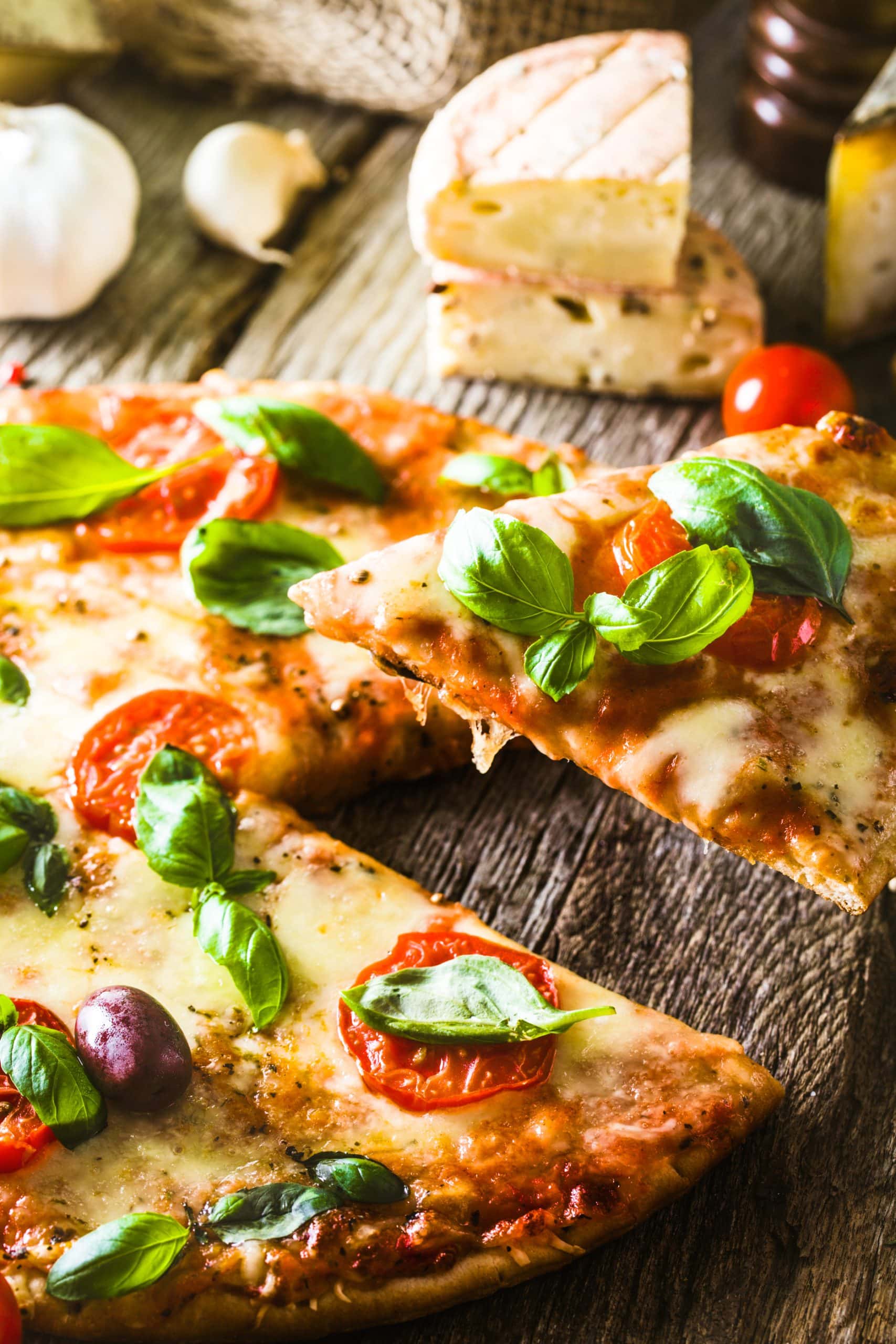How to Perfect a Classic Margherita Pizza with Fresh Mozzarella and Basil?

The tantalising aroma of a pizza just out of the oven is hard to resist. The combination of melted mozzarella, aromatic basil, and tangy tomato sauce on a crispy crust is a gastronomic delight. Baking the perfect Margherita pizza at home is an art. It is a culinary journey that combines subtle flavours with simple ingredients. This article will guide you on how to perfect this classic pizza recipe, ensuring every slice is a slice of heaven.
Key Ingredients for a Classic Margherita Pizza
The Margherita pizza stands out for its simplicity. Named after Queen Margherita of Italy, this pizza is a colourful representation of the Italian flag with red tomatoes, white mozzarella, and green basil leaves. The beauty of the Margherita pizza lies in the quality of its ingredients. The fewer the components, the more critical the quality becomes.
A voir aussi : What’s the Key to a Perfectly Roasted Duck with Cherry Sauce?
Dough
The dough forms the foundation of your pizza. Creating the perfect dough is a science. You need flour, water, yeast, salt, and a bit of sugar. Some prefer adding a dash of olive oil for a soft, elastic texture. The key lies in the kneading and proofing process – these steps will determine the final texture of your pizza crust.
Sauce
The sauce forms the tangy, heartwarming base of your pizza. Fresh ripe tomatoes, a pinch of salt, a sprinkle of oregano, and a drizzle of olive oil come together to create this perfect sauce. Some recommend using San Marzano tomatoes – an Italian variety known for their thick flesh and fewer seeds.
A découvrir également : Can You Bake a Lavender Honey Cake with a Lemon Glaze?
Toppings
The final taste of your pizza will be determined by the toppings you choose. In the case of a classic Margherita pizza, you will need fresh basil leaves, slices of fresh mozzarella cheese, and a generous drizzle of extra virgin olive oil.
The Art of Making the Perfect Dough
A perfectly baked pizza starts with a perfect dough. The dough’s elasticity and texture will determine how well it will hold the sauce and toppings, and how crisp or chewy your crust will turn out.
Start by activating the yeast with a little warm water and sugar. Once the yeast is frothy, add it to your mixture of flour and salt. If you’re opting for a softer crust, add olive oil to the mix. Then comes the kneading – a step where patience and tenacity come in handy. Knead the dough until it is smooth and elastic.
Next, let the dough rest. Cover it with a damp cloth and allow it to rise for about two hours. This process, known as proofing, allows the yeast to work its magic, resulting in a dough that is light and fluffy.
Crafting the Ideal Sauce
A great pizza requires a great sauce. For a classic Margherita pizza, a simple tomato-based sauce will do the trick.
Start by blanching and peeling your tomatoes. Then, crush them with a fork or run them through a blender. In a pan, heat some olive oil and add the crushed tomatoes. Season with salt, to taste, and add a sprinkle of dried oregano for that extra punch. Let the sauce simmer till it thickens.
Assembling and Baking the Margherita Pizza
With the dough and sauce ready, it’s time to assemble your Margherita pizza.
Start by preheating your oven to its highest setting. If you have a pizza stone, place it in the oven as it preheats. A pizza stone helps in evenly distributing the heat, resulting in a well-cooked pizza.
Roll out your dough to your desired thickness, and apply a thin layer of the sauce. Too much sauce can make the pizza soggy. Next, arrange the slices of fresh mozzarella cheese and basil leaves on top. Finally, drizzle some olive oil over the pizza.
Place the assembled pizza in the oven. Depending on your oven, it will require around 10-15 minutes to bake fully. You’ll know it’s done when the crust is golden and the cheese is bubbling.
Perfecting the Margherita Pizza
Remember, creating the perfect Margherita pizza is a blend of art and science. The ingredients, their proportions, and even the sequence in which they are added, play a crucial role in the final outcome. But in the end, the most important thing is the love and passion you put into making this classic dish.
So, don’t wait any longer. Grab these ingredients and start experimenting until you find your perfect Margherita pizza recipe. Happy baking!
The Home Pizza Oven Advantage
Having your own pizza oven at home can significantly boost your Margherita pizza quality. While a conventional kitchen oven can do the job, a pizza oven is specially designed to reach higher temperatures, which is a key factor in achieving the perfect crust.
Firstly, a pizza oven heats evenly, ensuring that every part of your pizza cooks at the same rate. This avoids the issue of a burnt crust with undercooked toppings, or a perfectly melted mozzarella on a doughy base.
Secondly, the high temperatures in a pizza oven – often around 450-500 degrees Celsius (840-930 degrees Fahrenheit) – allow for a quick cooking time. A faster cooking time means the mozzarella cheese will melt just enough without becoming rubbery, and the fresh basil leaves will retain their colour and flavour.
Lastly, the design of a pizza oven, particularly the stone base, provides the perfect platform for your pizza. The stone absorbs moisture from the dough, resulting in a crisp, delectable crust.
If a built-in pizza oven is out of your budget, a portable pizza oven or a pizza stone for your regular oven are excellent alternatives.
Expert Tips for Flawless Execution
To make a perfect Margherita pizza, a few expert tips might be useful.
First, remember to use a pizza peel to transfer your uncooked pizza to the oven. This tool will prevent your pizza from sticking to the surface, and help in achieving a uniformly cooked crust.
When it comes to the cheese, less is more – do not overload your pizza with mozzarella. You want to taste the harmony of all the ingredients, not just the cheese.
Also, add your basil leaves after baking, especially when using a pizza oven. The high temperatures can cause the leaves to burn, ruining their fresh flavour.
Lastly, experiment with your dough recipe. Different types of flour can yield different results, so you might want to try a few before deciding on your favourite.
Conclusion
Crafting a homemade Margherita pizza worth craving for is indeed an art, and this guide is aimed at helping you hone this craft. With the right ingredients, a perfected dough, and a well-crafted sauce, you’re halfway there. Having a good pizza oven or a pizza stone, a handy pizza peel, and following a few expert tips will elevate your pizza making journey.
Enjoy the process, appreciate the simplicity of a Margherita pizza, and soon, you’ll be serving up an irresistible, classic pizza that comes close to what you might find in Italy. Remember, the heart of a great pizza Margherita is not only in the quality of its ingredients but also in the love and passion you pour into making it. Enjoy every slice, every taste, and every moment of your pizza-making session. Happy baking!
